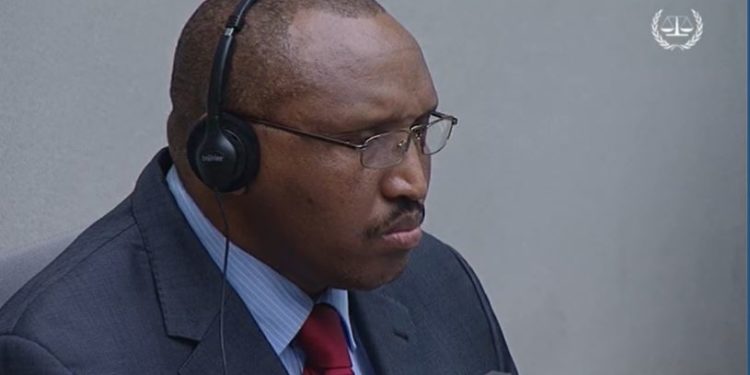By Susan Kendi
The International Criminal Court judges unanimously sentenced Bosco Ntaganda to 30 years of imprisonment. This is the highest prison sentence ever handed down by the ICC.The time that Ntaganda spent in ICC detention, March 22, 2013 to November 7, 2019, shall be deducted from his sentence.
In the sentencing judgement held on Thursday, November 7, 2019, the three judges in the case found that despite the magnitude of the crimes Ntaganda committed and his level of involvement, the crimes “do not warrant a sentence of life imprisonment.”
The judges in the trial comprised of presiding Judge Robert Fremr, Judge Kuniko Ozaki and Judge Chang-ho Chung.
Ntaganda also known as “The terminator” is the fourth individual to be sentenced before the ICC. Thomas Lubanga was sentenced to 14 years imprisonment, Germain Katanga 12 years in prison, which was later reduced for cooperating with the court and Ahmed Al Faqi Al-Mahdi was sentenced to 9 years imprisonment.
In the 117-page sentencing, the chamber acknowledged the credibility in Ntaganda’s testimony on his “suffering during the Rwandan genocide” and the “traumatic impact” it had on him.
This is the first time that the ICC has sentenced a commander for rape and sexual slavery offences against members of his own troop.
The 45-year-old was found responsible for committing sexual violence crimes against civilians and female members of the Union of Congolese Patriots (UPC) and its military wing Patriotic Force for the Liberation of Congo (FPLC) under the age of 15. Trial Chamber VI recognized the two types of victims of the sexual violence and gave a separate sentence for each of the victims.
The individual sentences for Bosco Ntaganda are as follows:
| Charge(s) | Type of crime | Number of Count(s) | Years of imprisonment |
| Murder and attempted murder | Crime against humanity and as a war crime | 1 and 2 | 30 years |
| Intentionally directing attacks against civilians | War crime | 3 | 14 years |
| Rape of civilians | Crime against humanity and as a war crime | 4 and 5 | 28 years |
| Rape of children under the age of 15 incorporated into the UPC/FPLC | War crime | 6 | 17 years |
| Sexual slavery of civilians | Crime against humanity and as a war crime. | 7 and 8 | 12 years |
| Sexual slavery of children under the age of 15 incorporated into the UPC/FPLC | War crime | 9 | 14 years |
| Persecution | Crime against humanity | 10 | 30 years |
| Pillage | War crime | 11 | 12 years |
| Forcible transfer of the civilian population | Crime against humanity | 12 | 10 years |
| Ordering the displacement of the civilian population | War crime | 13 | 8 years |
| Conscripting and enlisting children under the age of 15 years into an armed group and using them to participate actively in hostilities | War crime | 14,15 and 16 | 18 years |
| Intentionally directing attacks against protected objects | War crime | 17 | 10 years |
| Destroying the adversary’s property | War crime | 18 | 15 years |
Ntaganda’s lawyers and the Prosecution have 30 days to appeal the sentencing judgment.
During a sentencing hearing held in September 2019, Nicole Samson an ICC prosecutor requested for a 30 years imprisonment for Ntaganda for the 18 counts of crimes committed between 2002 and 2003 in Ituri region of the Democratic Republic of Congo.
Sarah Pellet, a victims’ lawyer representing 283 former children soldiers, proposed 30 years imprisonment for sexual slavery of child soldiers,20 years for rape, 20 years for children involvement in armed conflict,18 years for the conscription of children and 18 years for the enlistment of children.
Another victims’ lawyer, Dmytro Suprun, representing victims of the UPC/FPLC attacks, proposed life sentence noting the severity in the crimes committed by Ntaganda. Additionally, he requested for 20 years sentence for each crime committed excluding murder, rape and sexual slavery which he proposed 30 years for each of the crimes.
The defence did not propose any sentencing but argued that those serving a life sentence or longer than two decades have committed more ferocious crimes and have more direct involvement in the crimes compared to Ntaganda.
Giving examples, the lead defence lawyer Stéphane Bourgon, cited cases before the International Criminal Tribunal of Yugoslavia (ICTY) where the convicts are said to have had committed worse crimes with a higher degree of participation than Ntaganda.
In May this year, Ntaganda lawyers made a filing requesting the disqualification for Judge Kuniko Ozaki, one of the judges in Ntaganda’s case. The court document arose issues around judicial independence and impartiality of the judge who at the time was serving as the ambassador of Japan to Estonia. This request was rejected by a plenary of judges. Judge Ozaki resigned her ambassadorial post in order to remain in Ntaganda’s trial.
Ntanganda, who is Rwandan born is a former deputy chief of staff and commander of the FPLC. Two arrest warrants were issued against Ntaganda in 2006 and 2012.He later surrendered to the United States Embassy in Kigali Rwanda one year later, March 2013.
Sentencing judgement: https://www.icc-cpi.int/CourtRecords/CR2019_06674.PDF







